Preserving Dignity Through Advanced Refrigeration
A walk-in body refrigerator is essential equipment for any funeral home or mortuary facility that needs reliable body preservation. If you're considering purchasing mortuary refrigeration, here's what you need to know:
| Walk-In Body Refrigerator Quick Facts |
|---|
| Optimal Temperature Range: 34°F-39°F (1-4°C) |
| Standard Insulation: 4-inch thick foamed-in-place urethane |
| Typical Capacity: From 5 to 50+ bodies depending on configuration |
| Key Features: High-density insulation, digital temperature controls, customizable storage racks |
| Average Preservation Time: 4-6 weeks under proper conditions |
The silent guardians of mortuary science, walk-in body refrigerators provide the controlled environment necessary for preserving the deceased with dignity and respect. Unlike standard coolers, these specialized units are designed specifically for the unique requirements of funeral homes, morgues, and medical examiner facilities.
"With the 8'x12' Walk-In Cooler, I've got capacity for twenty-five people. I've become the largest refrigeration facility for human remains in Southern California because of proper refrigeration. It is literally a game changer in the funeral industry," shares one funeral director.
Modern walk-in body refrigerators combine advanced temperature control systems with high-density insulation to maintain precise conditions even when ambient temperatures fluctuate significantly. This reliability ensures that families have the time they need to make arrangements without feeling rushed during their time of grief.
For funeral directors managing multiple services, these units offer peace of mind through consistent performance and ample storage capacity. The best models feature modular designs that can be customized to fit your facility's specific spatial constraints and capacity needs.
When selecting a walk-in body refrigerator, consider not just your current needs but your facility's future growth. The investment in quality refrigeration pays dividends through energy efficiency, durability, and the professional service you can provide to families in their time of need.
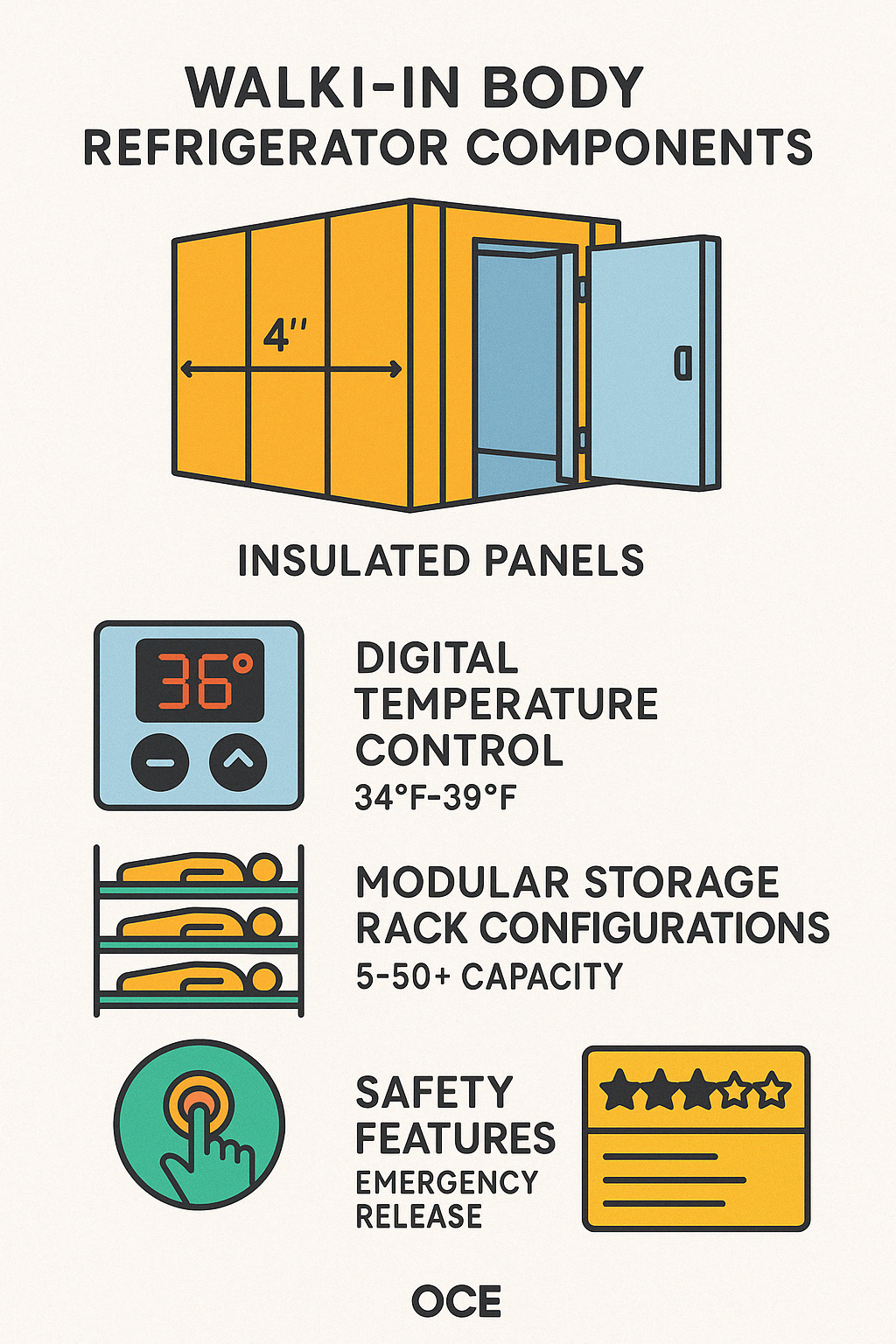
Walk-in body refrigerator definitions:
What Is a Walk-In Body Refrigerator?
When families entrust their loved ones to your care, having the right preservation equipment isn't just a practical necessity—it's a cornerstone of respectful service. A walk-in body refrigerator is exactly what its name suggests: a specialized cooling chamber designed specifically for the dignified preservation of those who have passed.
Unlike the refrigerator in your kitchen or even commercial coolers used in restaurants, these specialized units serve a higher purpose. They create the perfect environment for preserving human remains with care and respect at funeral homes, morgues, medical examiner facilities, and other institutions.
What makes a walk-in body refrigerator different from standard cooling units? The differences go far beyond size. These specialized chambers maintain a precise temperature range—typically between 34°F and 39°F—that slows decomposition without causing freezing damage to tissues. This precision matters tremendously in providing families with the time they need to gather, grieve, and make important decisions without feeling rushed.
The interior design reflects the sacred nature of the work, featuring respectful storage systems like tiered racks, smooth-gliding roll-out trays, or cantilever systems that allow for gentle and efficient handling. The 4-inch thick foamed-in-place urethane insulation isn't just about energy efficiency—it ensures temperature stability regardless of how hot it gets outside or how frequently the door opens.
"We understand that the families you serve deserve nothing less than excellence," says our lead engineer at American Mortuary Coolers. "That's why our walk-in body refrigerators incorporate antimicrobial surfaces and seamless construction that exceed industry sanitation standards."
Safety features reflect both practical needs and regulatory requirements. Interior release handles ensure OSHA compliance, while non-slip flooring and backup systems provide peace of mind that operations will continue uninterrupted—even during power fluctuations.
In the day-to-day operations of a funeral home, these refrigeration units become essential tools that:
- Create a bridge of time between death and final arrangements
- Provide flexibility in scheduling services to accommodate family needs
- Offer capacity adjustments during busy periods
- Support special circumstances requiring extended preservation
- Maintain the highest standards of care and dignity
Many funeral directors tell us their walk-in body refrigerator has transformed their ability to serve families. "Before we installed our walk-in, we were constantly juggling schedules and sometimes had to rush families," shares one Tennessee funeral director. "Now we can truly give each family the time they need, which has made all the difference in the quality of care we provide."
At its core, a walk-in body refrigerator is more than equipment—it's a commitment to excellence in end-of-life care, allowing you to honor the departed with dignity while supporting their loved ones through one of life's most difficult transitions.
Top Features of the Best Walk-In Body Refrigerators
Shopping for a walk-in body refrigerator can feel overwhelming. With so many options on the market, how do you know which features truly matter? As professionals who've been crafting these specialized units for years, we've learned what separates the exceptional from the merely adequate.
The best walk-in body refrigerators combine precision engineering with thoughtful design. They maintain perfect temperatures while being energy efficient, offer flexible storage options, and include safety features that protect both your staff and the dignity of those in your care.
Let's explore the features that truly make a difference in day-to-day operations:
Advanced Temperature Control Systems
Temperature control isn't just a feature—it's the fundamental purpose of a walk-in body refrigerator. The sweet spot for preservation falls between 34°F and 39°F (1-4°C). This narrow range is critical: too warm and decomposition accelerates, too cold and tissue damage occurs.
"I used to check our old unit constantly," one funeral director told us. "Now with digital controls, I can see at a glance that everything's perfect—even from my phone when I'm not at the facility."
Today's premium systems maintain a steady 35°F internal temperature even when the building heats up to 95°F during summer months. This consistency comes from sophisticated digital controllers that make tiny adjustments automatically.
The best systems include backup features like dual refrigeration with auto-switchover. If the primary system hiccups, the secondary kicks in automatically—perfect for facilities that aren't staffed around the clock. Add in remote monitoring that sends alerts to your phone, and you've got peace of mind that's worth every penny.
High-Density Insulation for Energy Efficiency
The walls of your walk-in body refrigerator matter more than you might think. Premium units use 4-inch thick foamed-in-place urethane insulation with R-values between 28 and 32. This isn't just about keeping cold air in—it's about saving money every month on your electric bill.
"When we upgraded to a new walk-in with 4-inch panels, our utility bills dropped by nearly 30%," shared a funeral home director from Tennessee. "The system runs less frequently but keeps temperatures more stable than our old unit with thinner walls."
Good insulation does more than save energy. It prevents condensation that can lead to mold growth, reduces noise from the refrigeration system (creating a more appropriate environment for a mortuary setting), and helps the entire system last longer by reducing wear and tear on the compressor.
For facilities in extreme climates, we also offer improved 5-3/8" thick panels with R-values up to 43 for freezers and 37.6 for coolers. This extra insulation pays for itself quickly in challenging environments.
Customizable Storage Solutions
Every facility has unique needs, which is why the interior configuration of your walk-in body refrigerator shouldn't be one-size-fits-all. Modern units offer remarkable flexibility to maximize capacity while ensuring respectful handling.
The modular approach allows you to configure storage based on your specific requirements. Many medium-sized facilities prefer a 24-body capacity using six four-tier storage racks. Others might need a mix of standard and bariatric storage options to accommodate larger individuals with dignity.
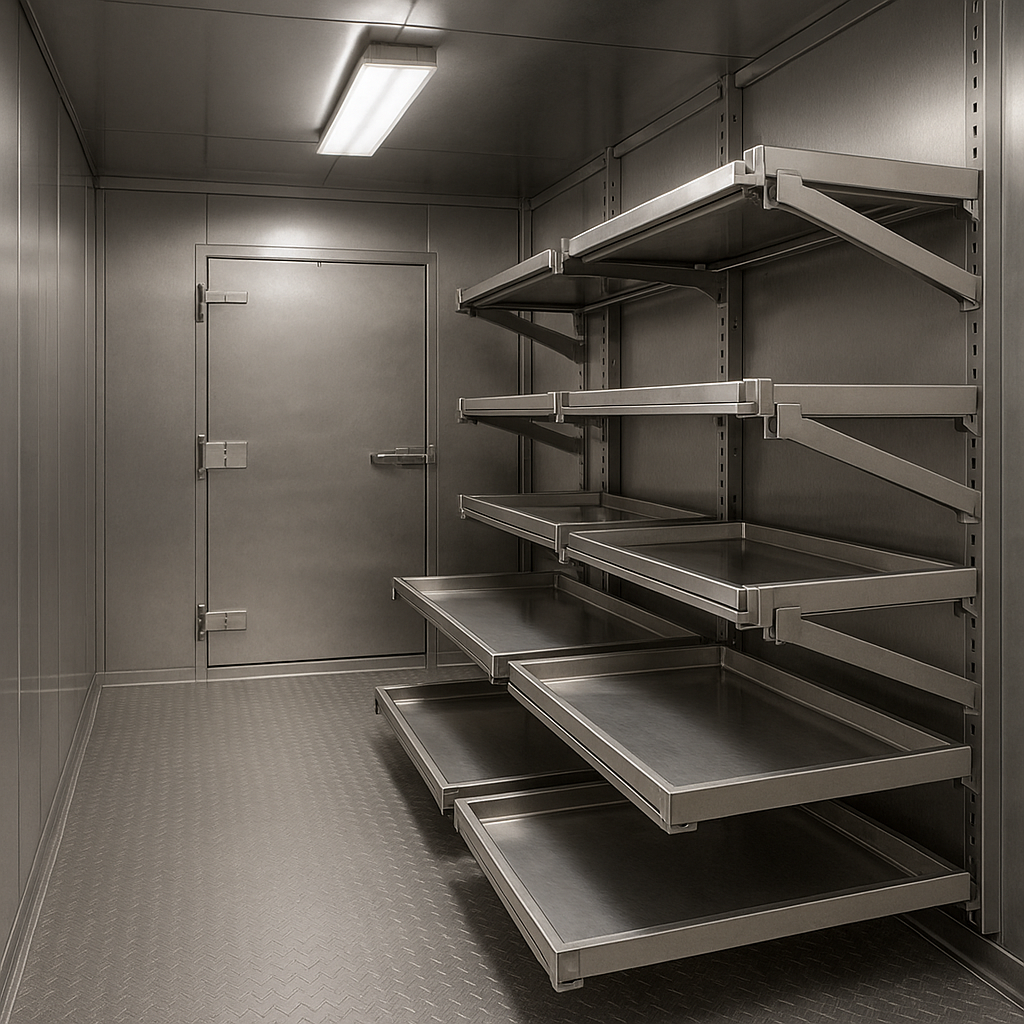
What makes these systems truly valuable is their adaptability. As your needs change, the storage configuration can change too. Cantilever racks can be adjusted, tiers can be added or removed, and the entire layout can be reconfigured without replacing the whole unit.
"We started with a basic configuration," one customer explained, "but as our community grew, we needed more capacity. Being able to add racks rather than buying a whole new system saved us thousands."
Improved Safety Features
Safety isn't optional when it comes to walk-in body refrigerators—it's essential for protecting both your staff and the dignity of those in your care. The best units include thoughtful safety features that often exceed industry standards.
OSHA-compliant safety release handles prevent anyone from being accidentally trapped inside. These allow doors to be opened from the inside, even if locked from the outside. Non-slip flooring reduces the risk of accidents when moving bodies in and out of storage.
Proper lighting matters more than you might think. Vapor-proof LED fixtures provide clear, shadow-free illumination that helps prevent mishaps during transfers. Door alarms alert staff if doors are left ajar, preventing temperature fluctuations that could compromise preservation.
"Safety features might seem like small details until you need them," notes our head of manufacturing. "We've heard too many stories about staff struggling with poorly designed units. That's why we incorporate multiple redundant safety systems, from heavy-duty hinges to emergency release mechanisms."
Energy-Efficient Condensing Units
The condensing unit is the heart of your walk-in body refrigerator—it's what actually creates the cold. Today's advanced units offer remarkable efficiency without sacrificing performance.
High-efficiency compressors use variable speed technology to match cooling output with actual demand. This means they work harder when needed (like after door openings) and throttle back when temperatures are stable, saving significant energy.
Modern refrigerants not only comply with environmental regulations but often perform better than older chemicals. Oversized condensers provide extra cooling capacity, allowing the system to recover quickly after doors have been opened.
"When selecting a walk-in system, the condensing unit is where you don't want to compromise," our technical director often advises. "A properly sized, high-efficiency unit might cost more upfront but will save you thousands over its lifetime while performing more reliably."
For facilities in regions with extreme heat, we offer specialized options like water-cooled condensers or improved air-flow designs that maintain optimal performance even when outside temperatures soar above 100°F.
At American Mortuary Coolers, we size our systems with 20% additional capacity beyond calculated requirements. This "breathing room" ensures units can handle peak demands without strain, extending equipment life and improving reliability when you need it most.
Choosing the Right Walk-In Body Refrigerator for Your Facility
Finding the perfect walk-in body refrigerator for your mortuary or funeral home isn't just about buying equipment—it's about making an investment that supports your service to families during their most difficult moments. At American Mortuary Coolers, we've guided countless funeral professionals through this important decision, and we understand that every facility has unique needs.
Think of your refrigeration system as the silent partner in your business—it needs to work reliably day in and day out, without drawing attention to itself. The right unit becomes nearly invisible in its efficiency, while the wrong choice can create daily headaches.
"I wish I'd known how much thought needed to go into choosing our walk-in," a funeral director from Ohio told us recently. "We initially focused just on price, but now I understand that capacity planning and energy efficiency actually matter more to our bottom line in the long run."
When you're evaluating options, start by honestly assessing your facility's size and case volume. A walk-in body refrigerator that's too small will create immediate operational problems, while oversizing significantly can waste energy and valuable floor space. Most of our clients find that planning for about 20% growth beyond their current needs provides the sweet spot for long-term value.
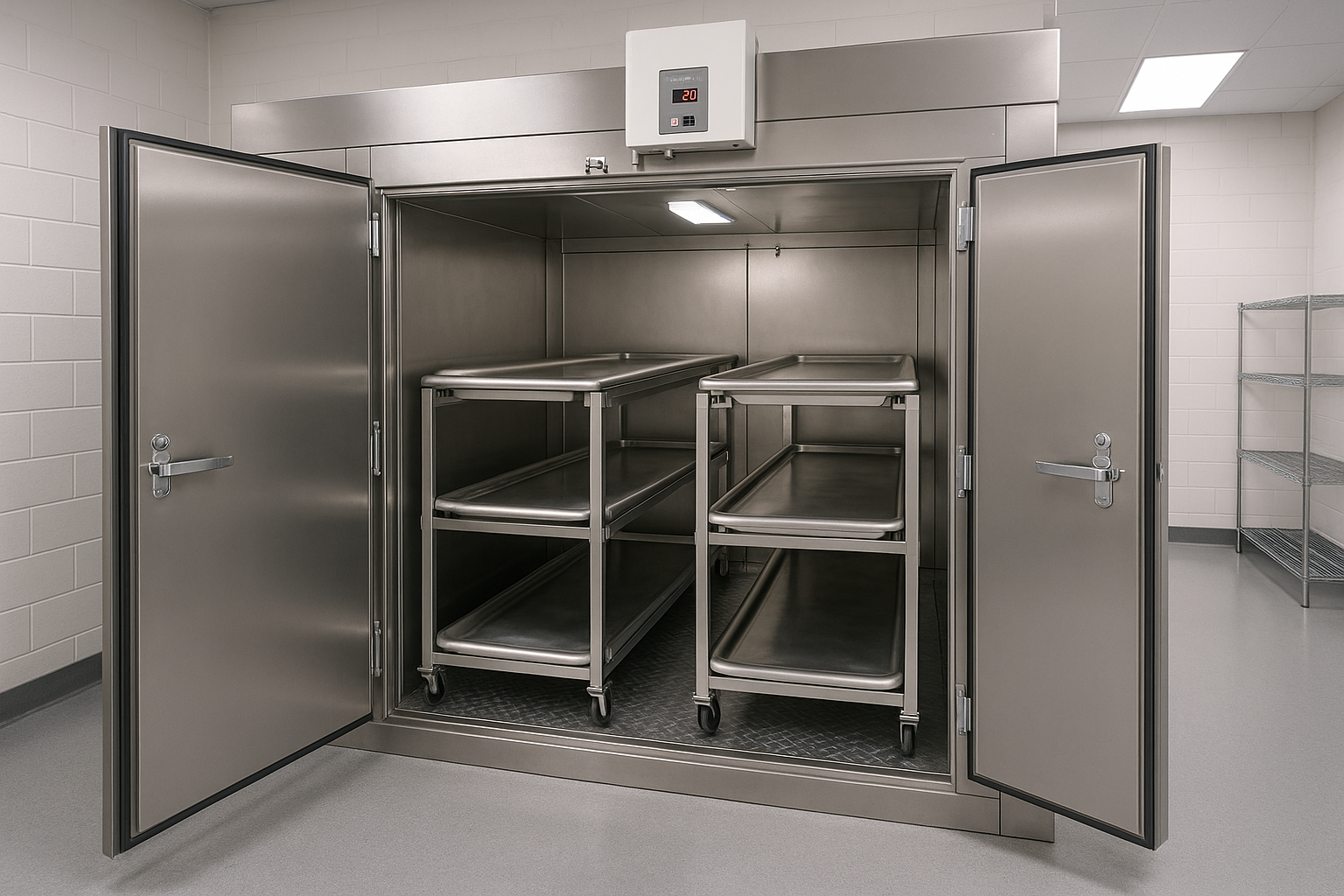
Storage capacity needs vary dramatically between facilities. A small family-operated funeral home might require space for just 5-10 bodies, while a large metropolitan facility serving as a regional hub might need accommodation for 30 or more. Be realistic about your peak periods—many funeral homes experience seasonal fluctuations that require additional capacity during winter months in colder climates.
The physical space in your facility will naturally influence your options. Our design team can work wonders with challenging spaces, creating custom configurations that maximize every square foot. We've installed units in basements with tricky access points, retrofitted them into historic buildings with preservation requirements, and even designed split units when a single continuous space wasn't available.
Energy efficiency becomes increasingly important as utility costs rise. The initial price difference between standard and high-efficiency units is typically recovered within 2-3 years through lower operating costs. In regions with extreme temperatures—whether the heat of Texas summers or the cold of Minnesota winters—investing in improved insulation and more robust condensing units pays dividends every month.
Your local climate matters more than you might think. A walk-in body refrigerator operating in humid Florida faces different challenges than one in arid Arizona. We take these environmental factors into account when recommending condensing units and insulation specifications, ensuring optimal performance regardless of your location.
Budget considerations are always important, but we encourage looking beyond the initial purchase price. A quality walk-in system from American Mortuary Coolers typically provides 15-20 years of service with proper maintenance. When you divide that initial investment across its useful life, the daily operational cost becomes quite reasonable—especially compared to the potential revenue loss and reputation damage that could result from refrigeration failures.
"We always remind clients that this isn't just equipment—it's peace of mind," explains our senior consultant. "When a family entrusts their loved one to your care, reliable refrigeration is non-negotiable."
From our strategically located facilities in Johnson City, Atlanta, Chicago, and other major cities, our team can provide personalized assessments for funeral homes across the contiguous 48 states. We understand the unique regional challenges you face, from regulatory requirements to climate considerations, and we're committed to finding the right solution for your specific needs.
The best walk-in body refrigerator for your facility is one that grows with you, operates efficiently, and provides the reliable service your families deserve. We're here to help you make that important decision with confidence.
Maintaining Your Walk-In Body Refrigerator
Taking good care of your walk-in body refrigerator isn't just about protecting your investment—it's about ensuring you can always provide dignified care for those entrusted to you. Think of maintenance as a promise kept to the families you serve, guaranteeing their loved ones receive consistent, respectful treatment while in your care.
Regular maintenance does more than prevent costly breakdowns. It extends the life of your equipment, improves energy efficiency, and maintains the proper environment needed for preservation. The peace of mind that comes from knowing your system is functioning reliably is truly priceless in our industry.
"I learned the hard way that skipping maintenance checks isn't worth the risk," shares Mike, a funeral director from Georgia. "One summer our system struggled during a heatwave, and those were some of the most stressful days of my career. Now we're religious about our maintenance schedule."
Regular Maintenance Checklist
We've found that the most successful funeral homes develop a rhythm for their maintenance routines. Daily quick checks become second nature, while more thorough inspections happen on a predictable schedule. Here's what we recommend to our clients:
Daily checks should become as routine as your morning coffee. Take a moment to verify temperature displays, check that doors seal properly, and ensure safety releases work smoothly. These five-minute inspections can catch small issues before they become emergencies.
Weekly attention should focus on cleanliness and function. Wipe down door gaskets with a mild sanitizing solution, look for any unusual condensation, and make sure floor drains remain clear. Many of our clients do this every Monday morning to start the week right.
Monthly care goes deeper. This is when you'll want to clean those condenser coils (dust is the enemy of efficiency!), check fan motors for proper operation, and give interior surfaces a thorough sanitizing with mortuary-grade cleaners. These monthly sessions typically take about an hour but save thousands in the long run.
Quarterly professional checks bring in specialized expertise. Have your refrigeration technician check refrigerant levels, inspect electrical connections, and test all temperature recording systems for accuracy. At American Mortuary Coolers, we can help connect you with qualified technicians familiar with mortuary refrigeration systems.
Annual comprehensive service is your system's yearly physical. This thorough check-up includes pressure tests, calibration of all controls, and verification of insulation integrity. Many of our clients schedule this during their slower season to ensure minimal disruption.
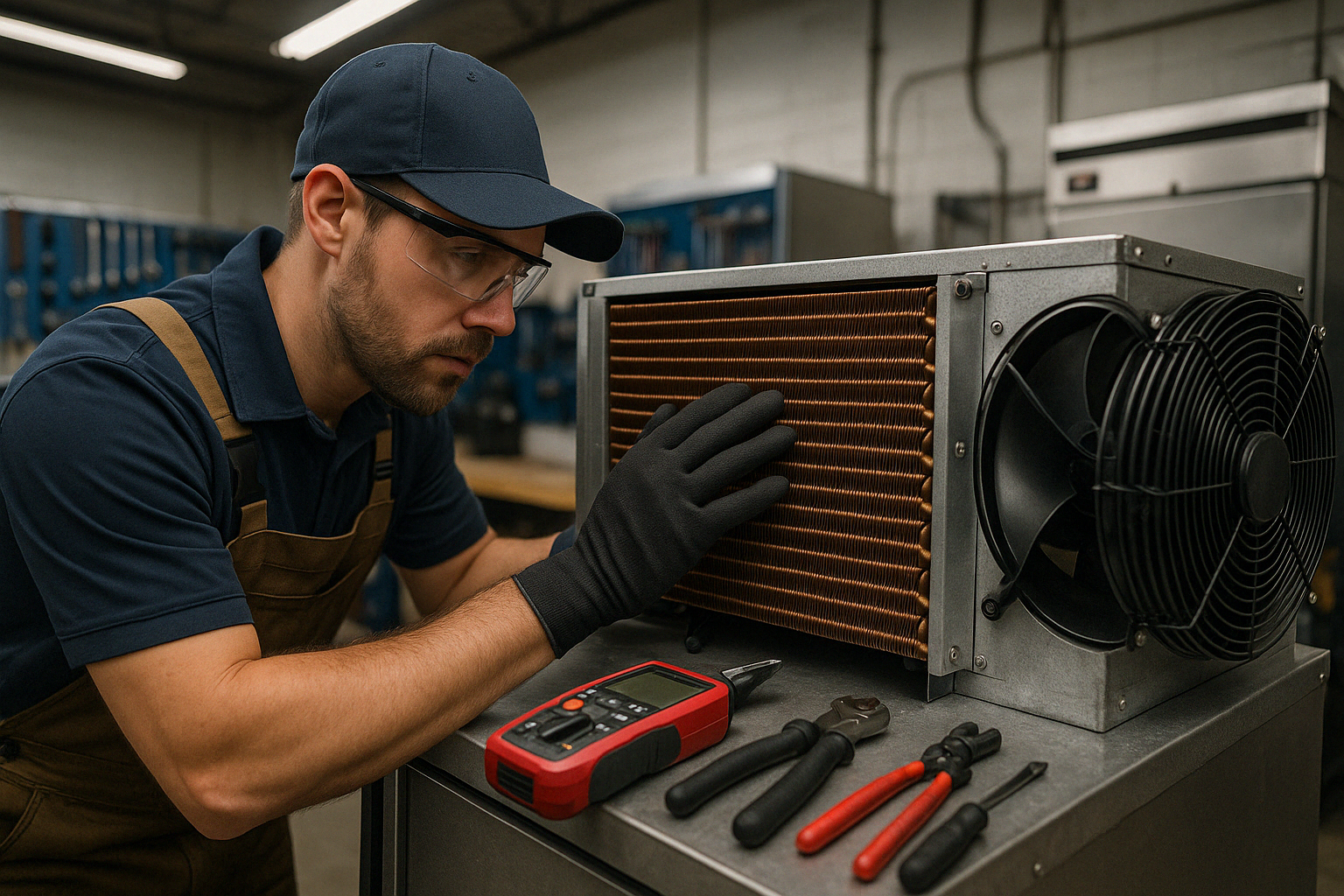
Sanitation Protocols
Maintaining pristine conditions inside your walk-in body refrigerator isn't just about appearances—it's a fundamental aspect of providing dignified care and meeting health regulations. Proper sanitation prevents cross-contamination and creates a respectful environment for the deceased.
Choose the right cleaning products specifically formulated for mortuary environments. These specialized cleaners effectively sanitize without damaging the interior surfaces of your unit. We're happy to recommend compatible products that won't compromise the materials in your American Mortuary Coolers unit.
Establish clear cleaning routines that all staff understand and follow. The best approach is to have cleaning protocols posted near the unit, with a sign-off sheet to ensure accountability. This documentation also proves invaluable during inspections or accreditation reviews.
Pay special attention to problem areas where fluids might collect. Floor drains deserve particular care, as do the tracks for rolling trays and the seams where panels join. A small bottle brush can work wonders for reaching these often-neglected spots.
Train all staff thoroughly on proper sanitation procedures. Make sure everyone understands not just how to clean, but why each step matters. This knowledge transforms cleaning from a chore into an essential part of the care you provide.
"We view maintenance not as an expense, but as an investment in our reputation," says our service director at American Mortuary Coolers. "When families entrust their loved ones to your care, they deserve the confidence that comes from properly maintained equipment."
Every walk-in body refrigerator we install comes with detailed maintenance guides custom to that specific unit. Our service teams across our regional network stand ready to provide both scheduled maintenance and emergency support when needed. From our locations in Johnson City, Atlanta, Chicago and beyond, we're never far away when you need us.
In our profession, reliability isn't optional—it's essential. A well-maintained walk-in body refrigerator is your silent partner in providing families with the time and peace they need during life's most difficult moments.
Frequently Asked Questions about Walk-In Body Refrigerators
What Are the Ideal Temperature Settings for Preserving Bodies?
When it comes to preserving the deceased with dignity, temperature control isn't just important—it's essential. The sweet spot for a walk-in body refrigerator falls between 34°F and 39°F (1-4°C). This narrow range exists for good reason.
If temperatures dip below 34°F, you risk tissue freezing, which can create complications during embalming and preparation. The ice crystals that form can damage cellular structures, making restoration work more challenging. On the flip side, if temperatures climb above 39°F, decomposition processes accelerate, potentially compromising the condition of the deceased before family members have a chance to say goodbye.
"I've seen the difference proper temperature control makes," shares one of our long-time clients. "Before upgrading to a digital system, we struggled with consistency. Now our walk-in body refrigerator maintains a steady 36°F regardless of what's happening outside."
Modern digital temperature controls maintain this critical range with remarkable precision—typically within ±1°C—even when external conditions fluctuate during hot summers or cold winters. What truly separates professional-grade units from modified commercial refrigerators isn't just the temperature reading itself, but the consistency throughout the entire space and the rapid recovery after door openings.
For facilities occasionally needing extended preservation, we can design systems with separate compartments maintained at around 28°F (-2°C). This slows decomposition further without full freezing, giving you additional flexibility when needed.
How Does the Insulation Quality Impact Energy Efficiency?
Think of insulation as the unsung hero of your walk-in body refrigerator. It silently performs a critical job that affects everything from your monthly utility bills to how consistently your unit maintains temperature.
The quality of insulation dramatically impacts both performance and operating costs. Our standard 4-inch thick foamed-in-place urethane insulation provides an R-value of approximately 28 for coolers. In plain English, this means your refrigeration system doesn't have to work nearly as hard to keep things cold.
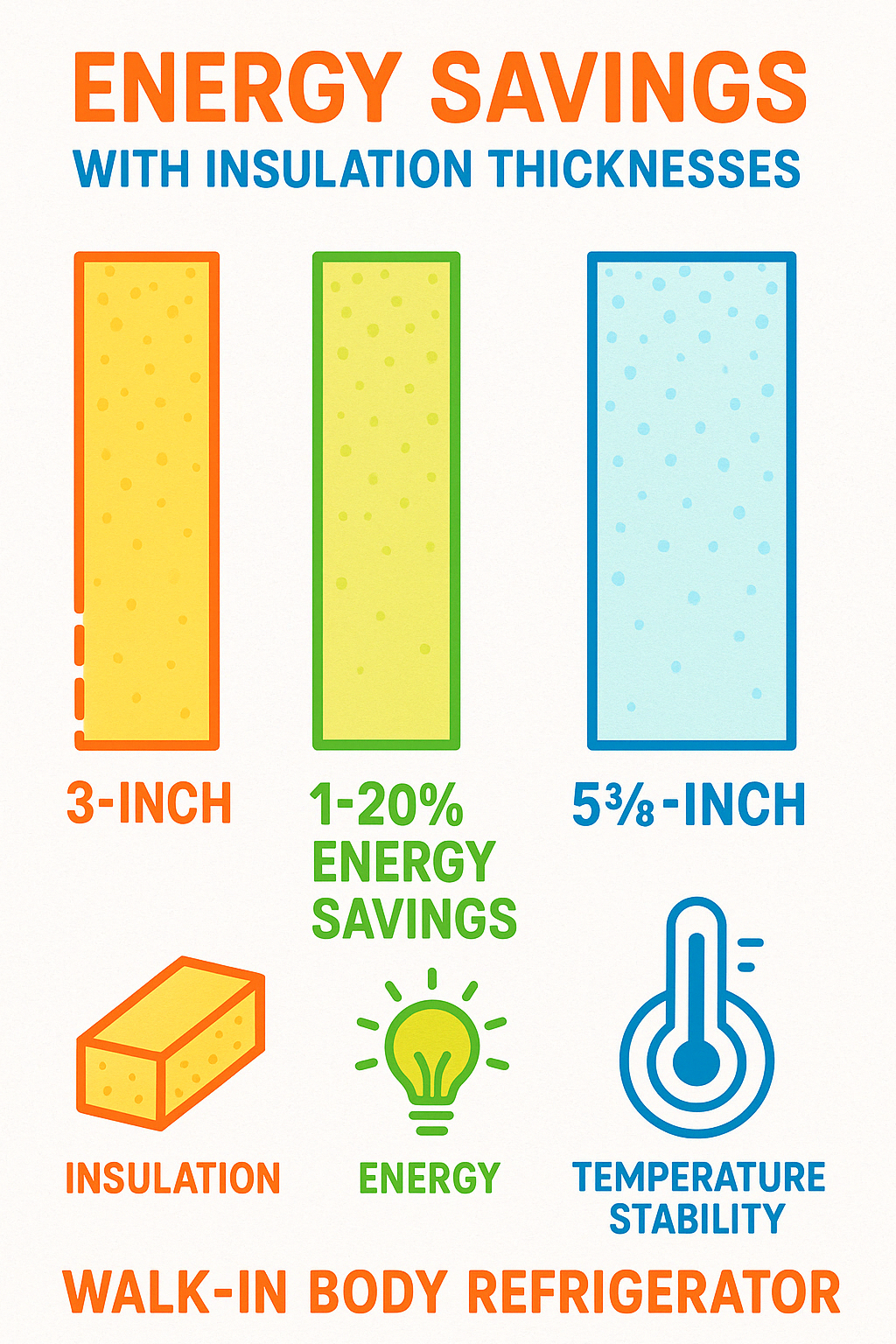
"When we upgraded from our old 3-inch insulated unit to the 4-inch panels, our electric bill dropped by almost $200 a month," reports a funeral director from Georgia. "The system runs less often, but maintains temperature better than ever."
This reduced cycling delivers benefits beyond just energy savings:
Longer equipment life is a natural result, as mechanical components experience less wear and tear when they don't need to run as frequently. Many of our clients report their systems still running flawlessly after 15+ years.
Better temperature stability means fewer fluctuations throughout the storage space. Superior insulation creates a more consistent environment by minimizing the impact of external temperature changes and reducing recovery time after door openings.
Fewer cold spots ensure more uniform preservation conditions for all remains in your care, regardless of where they're positioned within the refrigerator.
For facilities in extreme climates—whether the scorching Southwest or frigid Northeast—we offer improved 5-3/8" panels with R-values up to 37.6 for coolers, providing even greater protection against environmental challenges.
The initial investment in better insulation typically pays for itself within 2-3 years through energy savings alone. When you factor in the improved performance and extended system life, the value becomes even clearer.
What Customization Options Are Available?
No two funeral homes are exactly alike, which is why the ability to customize a walk-in body refrigerator is so valuable. At American Mortuary Coolers, we believe your refrigeration should fit your needs—not the other way around.
"We serve a community with a high proportion of elderly residents," explains a funeral director from Florida. "When we explained our need for more bariatric capacity, the American Mortuary Coolers team designed a custom solution with reinforced racks that has served us perfectly for years."
When it comes to storage configurations, flexibility is key. You might need a compact system for a smaller facility or an expansive setup for a medical examiner's office. We offer everything from intimate 5-body systems to expansive 50+ capacity installations. Our rack systems come in 2-tier, 3-tier, or 4-tier configurations to maximize your available space.
For staff comfort and safety, many clients opt for roll-out tray systems that reduce strain when moving remains in and out of refrigeration. These drawer-style systems can be particularly valuable for older staff members or facilities with limited personnel.
The physical structure itself is highly adaptable. We can create walk-in body refrigerators in virtually any dimension to fit your available space. Door options include traditional side-hinged doors, space-saving sliding doors, or roll-up styles for unique installations. Even the flooring can be customized—standard, reinforced for heavy traffic, or with ramp access for easier transport.
Beyond the basics, we offer operational improvements that can transform how you work:
Redundant refrigeration systems provide peace of mind for facilities that can't risk downtime, automatically switching to a backup system if the primary unit experiences issues.
Remote monitoring allows you to keep an eye on temperatures from your smartphone or computer, with alerts if any readings fall outside acceptable ranges.
Improved lighting options range from energy-efficient LED systems to specialized examination lighting for medical examiner facilities.
Security features such as specialized locks, access control systems, or monitoring capabilities help protect the deceased in your care and maintain chain of custody when needed.
From rural funeral homes to major metropolitan medical examiner facilities, we've created custom solutions for virtually every type of mortuary operation. Our design team works closely with you to understand your specific needs, often using 3D modeling to help visualize the final installation before manufacturing begins.
This collaborative approach ensures your walk-in body refrigerator perfectly suits both your current requirements and anticipated future needs—because the right refrigeration solution should grow with your business.
Conclusion
In the sensitive field of mortuary services, maintaining dignity and respect for the deceased while providing families with time for proper arrangements requires reliable, efficient refrigeration solutions. A high-quality walk-in body refrigerator is not merely equipment—it's an essential tool that supports the core mission of funeral service professionals.
Throughout this guide, we've explored what makes superior walk-in refrigeration systems truly stand out. From the precise temperature control that maintains that critical 34°F-39°F sweet spot to the high-density insulation that keeps conditions stable while saving on energy costs, these systems are engineered specifically for the unique demands of mortuary care.
The best walk-in body refrigerators offer customizable storage options that maximize capacity without compromising on respectful handling. Their advanced safety features protect both your staff and the dignity of those in your care, while energy-efficient operation reduces overhead without cutting corners on performance.
At American Mortuary Coolers, we've walked alongside funeral professionals for decades, listening to their challenges and crafting solutions that truly meet their needs. We understand that when you're caring for families during their most vulnerable moments, the last thing you need is equipment concerns.
"I never thought I'd say this about refrigeration, but our walk-in cooler has transformed how we serve families," shares one funeral director. "Having reliable, spacious storage means we can accommodate families who need more time without rushing their grief process."
Our Tennessee manufacturing team takes pride in building systems that stand the test of time. With regional representatives strategically positioned across the country, we're never far away when you need consultation, service, or support. From Johnson City to Los Angeles, from Chicago to Dallas, our team delivers not just equipment, but peace of mind.
For funeral homes considering an upgrade or planning new construction, we invite you to reach out for a conversation about your specific needs. Whether you're serving a small rural community or managing a large metropolitan facility, we can design a walk-in body refrigerator that fits your space, budget, and operational requirements.
Investing in quality refrigeration isn't just about preserving bodies—it's about preserving trust. When families place their loved ones in your care, they're counting on you to maintain dignity until the final goodbye. With the right refrigeration partner, you can focus on what matters most: supporting families through their journey of loss and remembrance.
For high-quality, customizable walk-in body refrigerators designed specifically for mortuary use, learn more about American Mortuary Coolers' premier solutions or contact our team for a personalized consultation today.



















